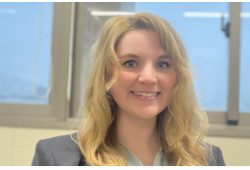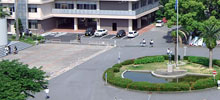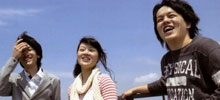学部紹介
教員紹介
イナキナイ・アレーナ

食料システムの視点から国際政治経済を解く
イナキナイ・アレーナ (Ynacay-Nye, Alayna)
アメリカ合衆国(ネバダ州)出身。京都大学経済研究科博士課程修了。博士(学術)。専門は政治経済学、農業社会学、水産社会学。2023年10月より長崎大学多文化社会学部。
I’m from the United States, Nevada. I graduated from Kyoto University’s Graduate School of Economics and was awarded a Ph.D. in Economics. My research areas are political economy, rural sociology, and fisheries sociology. I’ve been working at Nagasaki University’s School of Humanities and Social Sciences since October 2023.
⇒研究歴等の詳細へ
I specialize in the field of political economy. Mainly, I critically analyze political economic context (both historical and modern) of rural communities and the social, political, and economic impacts on rural (fisher) livelihoods, traditional knowledge structures, and marine resources. My research methods emphasize illuminating the realities on-the-ground through field work by listening to the stories and sharing knowledge from local people, namely in Japan, Thailand, and the United States.
Recently I have conducted research on the ongoing implications of privatization on sustainable fisheries governance, examining the growing role of corporate actors in decision-making.
【PHOTO】南タイの漁師さんとインタビューしたとき (2023年5月) Taken during an interview with southern Thai fishers (May, 2023) (Photo taken with permission from attendees, faces distorted for privacy purposes.)
Specialized Course: International Political Economy
In a world rapidly becoming more interdependent and more complex under globalization and neoliberalism, a political economy approach is needed to critically examine structures, hierarchies, and power dynamics of the international community. We can no longer dichotomize “global” and “local” because they are intrinsically linked and constantly influence each other. The food system is an easily relatable example of this phenomenon. By using the challenges in the food system as an example, we will explore how political and economic systems impact the distribution of wealth and opportunity amongst various levels of actors. This course challenges students to critically examine global issues and learn how to discuss political topics in a safe space.
【PHOTO】宮城県の牡蠣加工工場An oyster processing plant in Miyagi prefecture, Japan (Photo taken with permission from company CEO.)
As an educator, I aim to create an environment where students can explore their genuine interests and passions about the world around them. You do not have to be interested in food or fisheries studies to join my courses, just come with an open mind and a positive attitude toward learning something new. I hope students can find some topic or way of learning that encourages you to look forward to the future and be excited to help others or make the world a better place.




























